
After having to turn away patient after patient with brain and spinal cord issues, nurse Busha Hika decided enough was enough.
Hika was born in Ethiopia, in a small village called Bikiltu Kidame. There, villagers had no access to any sort of infrastructure. Hika grew up without any nearby roads, water, electricity, or healthcare. But those obstacles didn’t slow his desire to improve lives and help people.
Hika completed nursing school, then went to work in Halelu Hagelo, another remote village, treating all kinds of injuries and diseases.
Hika helped everyone as much as he could – from delivering babies to providing life-saving care on extreme traumas – but he couldn’t treat neuro patients. The clinic didn’t have the technology or expertise to address conditions like brain bleeds or spinal cord injuries, and they couldn’t refer them elsewhere. The closest neurosurgeons were days away in Ethiopia’s capital, Addis Ababa.
Even if patients managed to make the trek to the capital, there was no guarantee a clinic would accept them. Because there are only a few neurosurgeons in the entire country, it can take weeks or even months to receive care. After watching these patients suffer because of a lack of accessibility, it affirmed Hika’s interest in neurosurgery.
“That intrigued me and pulled at my heart,” Hika said. “I wanted to do neurosurgery so
I could help with these problems, in some way.”
After getting a visa from the green card lottery program, Hika moved to the United States in 2012. Shortly after, he joined the Army National Guard to learn more about U.S. culture and language, wanting to get accustomed to life in the United States as soon as possible. Earning some money was a plus, too.
While serving in the 1st Battalion, 125th Field Artillery unit in Minnesota, Hika made time to earn his bachelor’s degree from South Dakota State University and he applied to medical schools across the country.
Hika was accepted into the MU School of Medicine, where he met Farhan Siddiq, MD, associate professor of neurosurgery and Hika’s mentor. Siddiq coached him through the different neurosurgery specialties and the residency matching program.
“I was impressed by his commitment to neurosurgery,” Siddiq said. “He’s in a completely new country and new language, but it hasn’t stopped him from learning how to adapt and learn. He’s a very hardworking man – he’d always be the first to arrive and the last to leave.”

Hika is grateful for the education, support and mentorship he received at the School of Medicine. While studying, he received the Samuel P.W. Black award, which recognizes those who have exhibited excellence in the neurosurgery field.
“I would not be where I am today if it wasn’t for my mentors,” Hika said. “I was so fortunate to find advisors at the School of Medicine and the neurosurgery program.”
Once he completes his residency, Hika hopes to use his newfound knowledge from the School of Medicine and his residency to help with neurosurgery worldwide. He still plans to practice in the United States, but he wants to work on global neurosurgery by collaborating with existing organizations, particularly in areas of Africa, Asia and South America. These areas, often impoverished, have little to no access to healthcare -- and even less access to neurosurgeons – places like Halelu Hagelo.
“In my opinion, the best and most effective way to curb the need for global neurosurgery is to train people who actually live there,” Hika said. “If I help them, and that creates a way to train their own people, their own physicians -- that means they can take care of more people.”
But that is all for another day. Soon, Hika will graduate from the MU School of Medicine. As he walks across that graduation stage, his parents will be seeing him for the first time in five years, marking their first trip outside of Ethiopia. Neither of his parents had educational opportunities; his mother didn’t graduate high school, and his father didn’t go to college. As far as Hika is concerned, they’re walking beside him, too.
“It’s not just my degree,” Hika said. “It’s also their degree. They’ve sacrificed so much.”
Hika will be starting his neurosurgery residency at Case Western Reserve University in Cleveland, Ohio this summer.





